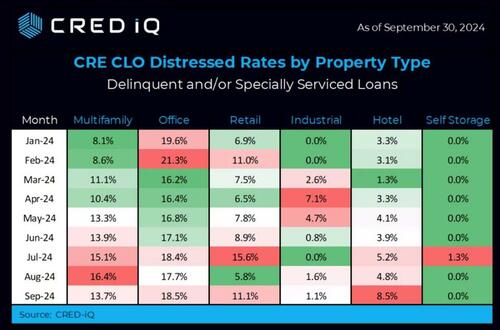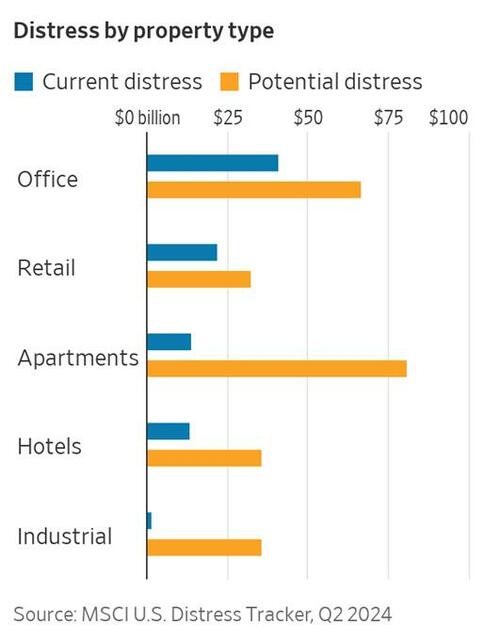(Zero Hedge)—Commercial real estate continues to suffer despite the Federal Reserve’s attempt at ameliorating the capital markets with a 50-basis point rate cut in September.
The pain is especially apparent in the so-called “CRE-CLO” bond market. CRE-CLO bonds are packaged commercial real estate mortgages comprising short-term floating rate loans. These bridge loans were recently, and most notably, used to facilitate the biggest apartment investment bubble in history, but were also used in financing other commercial real estate sectors including office, retail, hotel, industrial, and self-storage.
Most of the current batch of bridge loans originated in the 2020-2022 period—when benchmark rates were near zero and commercial real estate prices were peaking—and carried maturities of three to five years. Benchmark rates are now much higher, prices much lower, and property performance far worse than anticipated. Thus, a wall of maturities is staring borrowers, lenders, and bondholders in the face, all while underlying property performance disappoints.
Despite attempts by lenders to extend and pretend—kicking the can down the road in the short term to avoid defaults until the Federal Reserve lowers rates enough to bail them out—their delusions of reprieve may be fading fast.
Apartment Investors Play Checkers Instead of Chess
At the end of Q3, the distress rate for CRE-CLO loans across all commercial real estate sectors reached 13.1 percent, an all-time high. Distress in this instance is defined as any loan reported 30 days or more delinquent, past the maturity date, in special servicing (typically due to a drop in occupancy or a failure to meet certain performance criteria), or any combination thereof.
While roughly one in seven loans meets these criteria, the weakness is concentrated in two or three sectors.
Unsurprisingly, office properties have the highest rate of distress, with nearly one in five CRE-CLO office loans experiencing current distress. This is to be expected after the covid panic of 2020, subsequent to which various “work-from-home” directives essentially made the office market obsolete.
For similar reasons, distress is also high in the retail segment, as all but the most well-heeled retailers were forced under by the maniacal and criminal government edicts of the time.
However, the real story here is in the apartment, or multifamily, sector. Seen in Figure 1, the distress rate for apartments touched 16.4 percent in August. An astonishing number, indicating that one in six apartment bridge loans were distressed. The improvement to 13.7 percent shown for September is seasonal, as renters settle in at the start of the school year.
While this picture is bad enough, the reality under the surface is far worse. As reported by the Wall Street Journal, using Q2 data from MSCI, the batch of currently distressed apartment bridge loans comprise roughly $14 billion in total loans, but there exists an additional $81 billion in potentially distressed loans. MSCI categorizes loans as “potentially distressed” if they have seen delinquent payments, forbearance (when the lender lets interest payments accrue rather than taking a default action), or where key performance metrics like occupancy and net operating income are dangerously low.
Preserve your retirement by backing it with physical precious metals. Request the free, definitive Gold Guide from Genesis Gold Group.
The arithmetically-aware will note that if the $14 billion of currently distressed apartment bridge loans comprise a roughly 14 percent distress rate at the end of Q2 (as shown in Figure 1) and there are an additional $81 billion in potentially distressed loans not yet categorized as “currently distressed” (as shown in Figure 2), then MSCI data implies that 95 percent of all apartment bridge loans are either currently distressed or in imminent danger of distress.
While astounding, this level of distress will come as no surprise to veterans of the apartment market. In the 2020-22 period, bridge loans of this variety were ubiquitous above a certain minimum loan size. And, because of the extreme and reckless nature of money printing undertaken by the Federal Reserve during this time—when interest rates were effectively zero—lenders underwrote property acquisitions with a 1.0x debt service coverage ratio (“DSCR”), meaning the initial net operating income of the property was projected to just cover interest payments, with nothing left over.
Bridge loan interest rates floated at a spread (typically around 350 basis points, or 3.5 percent) to the Secured Overnight Financing Rate (“SOFR”), which was essentially 0 percent until mid-2022. Because of the 1.0x DSCR standard, a property acquired during this period that had net operating income of $1 million would have also had interest payments of $1 million at the then-prevailing interest rate of 3.5 percent.
SOFR is now 4.9 percent, indicating a total interest rate of 8.4 percent (SOFR + 3.5 percent spread). This same property now has interest payments of $2.4 million while net operating income is unlikely to have increased to any significant extent, if at all. Insurance and property tax increases in particular have damaged apartment profitability while rent increases have been difficult to execute in the face of stagnating real wages. By the same token, absurdly optimistic renovation plans have been impossible in the face of cash flows increasingly shunted towards paying interest.
The Amazing Disappearing Rate Cut
The high amount of potential distress in CRE-CLO bonds, and the loans that underlie them, indicate an expectation on the part of lenders that help is coming in the form of lower interest rates. After all, capital markets have become used to being bailed out by the Federal Reserve, all but demanding that the taxpayer—not they—be held responsible for their poor decisions. Nevertheless, the Fed’s recent rate cut is proving not to be the magic bullet on which lenders relied.
By August of this year, futures markets had fully priced in a 25-50 basis point Fed rate cut in September, and were expecting additional 25 basis point cuts in November and December. This expectation for the Fed Funds Rate carried over into Treasury yields, a key benchmark for the commercial real estate industry. Particularly important in the case of distressed bridge loans since any hopes of refinancing are placed not on more bridge loans—which are now much less pervasive—but on the fixed-rate agency market comprising Fannie- and Freddie-backed apartment loans, which prices loans off a spread to treasuries.
At the beginning of August, as markets priced in 75-100 bps of Fed rate cuts by year-end, 10-year Treasury yields reacted accordingly, dropping from 4.30 percent in late July (they had been 4.70 percent in April) to 3.65 percent in the middle of September. As of early November, most of that move had been erased—with yields back near 4.30 percent—roughly where they were prior to market pricing in this year’s Fed rate cuts.
Fear and Trembling
Undeniably, participants in the commercial real estate market—apartment bridge lenders in particular—are relying on loose monetary policy for their immediate salvation. They may get their wish. While Treasury rates have moved stubbornly higher, market forces only mean so much if the Fed decides to supplement rate cuts with purchases of treasuries, driving yields lower—another round of quantitative easing.
Nevertheless, to the extent they’re allowed to be heard, market signals are unmistakable. A regime that can’t stop spending and continues to appropriate the property of its citizens through inflation will provide upward pressure on Treasury yields, all else equal. In a free market context, the rent-seekers that comprise the commercial real estate market will have to work out their own salvation.

It’s becoming increasingly clear that fiat currencies across the globe, including the U.S. Dollar, are under attack. Paper money is losing its value, translating into insane inflation and less value in our life’s savings.
Genesis Gold Group believes physical precious metals are an amazing option for those seeking to move their wealth or retirement to higher ground. Whether Central Bank Digital Currencies replace current fiat currencies or not, precious metals are poised to retain or even increase in value. This is why central banks and mega-asset managers like BlackRock are moving much of their holdings to precious metals.
As a Christian company, Genesis Gold Group has maintained a perfect 5 out of 5 rating with the Better Business Bureau. Their faith-driven values allow them to help Americans protect their life’s savings without the gimmicks used by most precious metals companies. Reach out to them today to see how they can streamline the rollover or transfer of your current and previous retirement accounts.
Kamala Harris Says the American Dream Is “Gone”
by Modernity News
During a pre recorded interview, Kamala Harris once again failed to deliver any substantive outline of her policies, primarily attacking Donald Trump’s outlook and his first term in office. At one point when speaking about the economy, Harris appeared to suggest, in stark contrast to Trump, that the American Dream…
Gold Price Forecasts Skyrocket Following Moves by China and the Fed
by Sponsored Post
With the Federal Reserve beginning what most expect to be a sustained easing cycle, momentum continues to rise for gold and silver. Values have been steadily rising and the newest forecasts point to even more gains down the road. At the end of September, BMO Capital Markets published updated commodity…
Taxes and Tariffs and Trade: Oh My! Trump’s Plan to Bolster the Economy
by Just The News
In a bid to build a broader coalition, former President Donald Trump has outlined a vision of tax cuts, import tariffs, and “reciprocal trade” to preserve and restore American industries. Since coming down the escalator of Trump Tower in 2015, the Republican standard bearer has espoused unconventional trade policies and…
Expert Testimony: Mass Immigration Under Biden-Harris Is Driving Up Rents for Americans
by Breitbart
The arrival of millions of foreign nationals, many of whom are illegal aliens, under President Joe Biden and Vice President Kamala Harris is helping to drive up rents for working- and middle-class Americans, an expert witness told Congress Wednesday. Center for Immigration Studies Director of Research Steven Camarota told the…
This Year Marks First Since 1958 That Us Held No Oil and Gas Lease Sales
by Just The News
This year will be the first year since 1958 that the Bureau of Ocean Energy Management held no offshore oil and gas lease sales. Energy expert Alex Epstein, author of “Fossil Future,” argued at a recent House Budget Committee hearing the United States’ record-high oil production is in spite of…
Kamala’s Devastating Middle Class Taxes
by Independent Sentinel
With the election coming up, the IRS plans to reduce our taxes for 2025. it’s a common tactic to make it seem like they won’t tax us into oblivion once they return to office. CBS News: Some Americans could see lower federal income taxes in 2025 due to an annual…
Congress Passes Stop-Gap Spending Bill After Failed Mike Johnson Gambit
by Breitbart
Congress on Wednesday passed legislation that would fund the government through nearly the end of December. The House and the Senate passed a stop-gap spending bill that would push the government spending deadline to December 20. The measure, otherwise known as a continuing resolution (CR), keeps federal spending the same….
A ‘Bipartisan’ Bar Tried to Open in DC, Then Libs Cried That an Elephant Image Was ‘Hurtful.’
by The National Pulse
A new bar in Washington, D.C., whose political theme focused on bipartisan agreement and debate, succumbed to partisan pressure before the establishment could even serve its first drink. Originally billed as Political Pattie’s, the bar was flooded with complaints by liberals who said the establishment’s logo—specifically the Republican Elephant—was offensive…
Newsom Signs Bill Requiring Janitors to Take $200 Sexual Harassment Training
by Just The News
California Gov. Gavin Newsom signed a bill requiring companies that hire janitors to make sure janitors take sexual assault training every other year, and pay $200 per participant for sessions with under 10 janitors present, and $8 for sessions with 10 or more janitors. The bill also requires the government…
Biden-Harris Regime Prepares Another $8 Billion in Military Aid for Ukraine During Zelensky’s Washington Visit
by The Gateway Pundit
The Biden-Harris regime is once again prioritizing foreign interests over the well-being of American citizens, with plans to announce an eye-watering $8 billion in military aid for Ukraine during Ukrainian President Volodymyr Zelensky’s visit to Washington. This massive giveaway comes as Americans continue to face economic hardships, skyrocketing inflation, and…
‘Economic Dystopia:’ Silicon Valley Tycoon Predicts AI Will Take Over 80% of All Work
by Breitbart
Vinod Khosla, legendary Silicon Valley investor and entrepreneur, has predicted that AI will replace the majority of work in most jobs, necessitating the implementation of universal basic income (UBI) to prevent economic instability and inequity. Fortune reports that in a recent blog post, Vinod Khosla, the billionaire co-founder of Sun…


